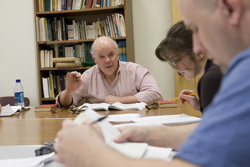Tompkins connects the classics to modern life
| When it comes to true academic challenges, there are few that rival Homer’s epic poem The Odyssey.
The master work takes the reader through the Greek warrior Odysseus’s 10-year journey as he returns to Ithaca from Troy after the Trojan War. It’s a staple of classics departments around the world and is usually read in its English translation. But not in Great Teacher Award winner Dan Tompkins’ "Intermediate Greek" class. His students read the challenging work as it was originally written: in Greek. Using a combination of humor, a prodigious knowledge of the text and pop culture references ranging from Fox News to “Batman” (the TV show, not the movie), Tompkins guides them in translating the text, employing his trademark pragmatic teaching style. |
 Photo by Joseph V. Labolito/Temple University
Great Teacher Award winner Dan Tompkins discusses a text with students in his "Intermediate Greek" class.
|
|
|
|
|
And while it sounds like a whole lot of work — and it is, his students say — Tompkins’ ability to tailor the discussion to the individual somehow makes it seem less arduous. “I’m not exaggerating when I say that Dr. Tompkins is one of the best, if not the best professor I’ve had,” said Elizabeth Torresson, an undergraduate classics major and senior thesis advisee of Tompkins. “It’s really very simple. He makes his students want to learn — to want to shoot for the stars. He values every student and appreciates their unique gifts.” It is those unique gifts of Temple students, and the chance to build a Department of Greek and Roman Classics from scratch here, that first attracted Tompkins to Temple in 1976. “I liked the urban location,” he said. “And I care about the Temple mission a lot. I also like the chance to help build the department.” Tompkins has been chair of the College of Liberal Art's Department of Greek and Roman Classics three times, most recently from 1990 to 1993. He also served as faculty fellow for learning communities, coordinator of the peer review of teaching program, and director of the Intellectual Heritage Program. Currently, he serves as the area coordinator for the General Education program’s race and diversity and world society areas and has also worked on a variety of teaching committees, including the development team for the General Education program’s studies in race, the university core program, and the development committee for learning communities. Tompkins also serves as chair of the committee on the classical tradition for the American Philological Association and is a past winner of the association’s Excellence in Teaching Award. He sees winning the Great Teacher Award as his admission into a pantheon of some of the country’s top scholars. “I was very pleased,” he said. “I put a lot of work into my teaching. I have a lot of respect for the past winners of this award and I’m glad to be a part of that group.” While he teaches material that may seem daunting to some, Tompkins never underestimates his students’ potential. In fact, students say, he makes it a point to do everything possible to see that they both understand the material and can apply it in their future endeavors. For example, Tony Keddie, a senior majoring in religion, is taking "Intermediate Greek" so that he can someday read the New Testament and other early Christian literature. He said Tompkins has found ways to connect his classroom lessons to the other subjects he’s studying. “(Tompkins) makes the language transcend the text so that we not only know a whole lot about The Odyssey, but also about classical literature supplemented by modern references. He often finds a way to connect the language to the interests of the people in our course,” he said. “Somehow — and I don’t know really know how he does it — he finds ways to keep all of us totally enthralled and eager to delve into the text in each class.” “Dr. Tompkins possesses an intelligence that should subdue any academic crossing his path,” added Rori Smith, a junior majoring in classics and anthropology. “However, he is not the least bit intimidating. Despite his overflowing wisdom, he is not a professor who elevates himself above his students; (he) does the exact opposite. He puts himself into his student’s shoes.” Tompkins earned his Bachelor of Arts from Dartmouth College and received both his master’s and doctoral degrees from the Yale University Department of Classics. |